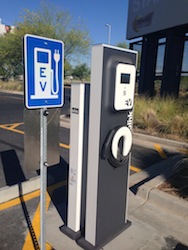 The developer of an alternative to regular diesel fuel has received a grant to develop the environmentally dimethyl ether, better known as DME, made from shale gas and biogas from animal, food, and agricultural waste. Oberon Fuels is receiving a $500,000 grant from the San Joaquin Valley Air Pollution Control District (SJVAPCD) to produce fuel-grade DME at its facilities in California. And once the fuel is developed, it will partner with Volvo Trucks in North America and Safeway, Inc. to test the clean-burning DME:
The developer of an alternative to regular diesel fuel has received a grant to develop the environmentally dimethyl ether, better known as DME, made from shale gas and biogas from animal, food, and agricultural waste. Oberon Fuels is receiving a $500,000 grant from the San Joaquin Valley Air Pollution Control District (SJVAPCD) to produce fuel-grade DME at its facilities in California. And once the fuel is developed, it will partner with Volvo Trucks in North America and Safeway, Inc. to test the clean-burning DME:
The approved project focuses on using DME as a near-zero emission solution for heavy-duty trucking. Oberon Fuels has developed a patented, skid-mounted, modular design for DME production. This small-scale process enables the development of regional fuel markets that can service local customers engaged in regional haul, initially bypassing the need for a national infrastructure. For the grant collaboration, Oberon plans to produce DME from renewable feedstocks such as animal, food, and agricultural waste, preventing methane from being released into the atmosphere and converting the waste to a usable, clean-burning fuel.
Volvo Trucks in North America has announced its intention to commercialize DME-powered vehicles for North America by 2015 and is working with Oberon in field tests. Working with both Volvo and Safeway, Inc., one of the largest food and drug retailers in North America, Oberon Fuels has received support from several governmental programs and agencies, including the San Joaquin Valley Air Pollution Control District and the California GO-Biz office.
DME will be used in two heavy-duty Volvo trucks driven by Safeway. The trucks will be piloted from their Tracy, Calif. distribution center located in the San Joaquin Valley. With 1641 stores across North America and a substantial trucking fleet, Safeway, a Pleasanton, Calif.-based corporation, is committed to environmental sustainability.
“It’s exciting to have a global leader like Volvo Trucks partnering with California companies to develop innovative technology in the Golden State,” said Kish Rajan, director of the Governor’s Office of Business and Economic Development (GO-Biz). “The State of California continues to attract the most dynamic companies in the world, and GO-Biz looks forward to helping Volvo and Oberon maximize the benefits of DME as a commercial transportation fuel.”
Oberon’s Brawley, Calif. plant is expected to be producing the fuel-grade DME this month, with up to 10,000 gallons per day production eventually.
 The latest edition of of Sierra, published by the Sierra Club, features which plug-in hybrids go the extra mile. The annual Electric Vehicle Guide reviewed six vehicles: Chevrolet Volt, Ford C-Max Energi, Ford Fusion Energi, Honda Accord Plug-In, Fisker Karma, and Toyota Prius Plug-In.
The latest edition of of Sierra, published by the Sierra Club, features which plug-in hybrids go the extra mile. The annual Electric Vehicle Guide reviewed six vehicles: Chevrolet Volt, Ford C-Max Energi, Ford Fusion Energi, Honda Accord Plug-In, Fisker Karma, and Toyota Prius Plug-In.









